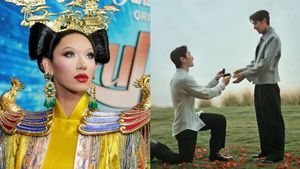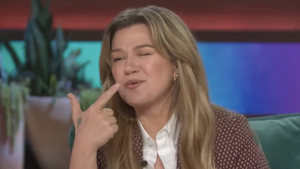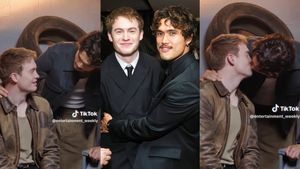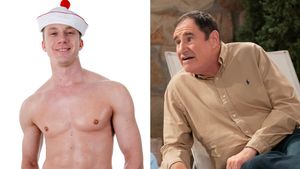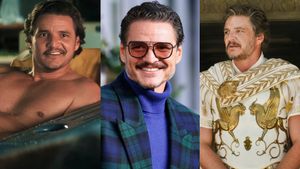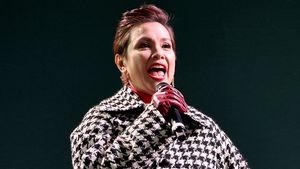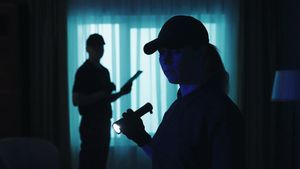I am a Black, sexually fluid man from the South.
Growing up, each intersection of race, sexuality, and culture presented a unique challenge, yet it also offered profound lessons in empathy and resilience. As a 90’s child, the challenges I faced were a tangled web of racial, sexual, and gender expectations. The only language I had at the time was straight, gay, and bisexual; I was told that not only was I supposed to pick one, but my only option was a female attraction based on expectations.
But in my heart, bisexuality felt the most for me.
In the South, the notion of being assigned male at birth came with a rigid script: how you should walk, talk, and love. What should your interests be, and how should you show your emotions? This "one size fits all" mentality left little room to explore who I was to the full extent. For many queer Southern kids, this meant hiding our true selves from family, friends, and even ourselves.
Media representations only compounded these struggles. I longed for camaraderie with characters on screen, but bisexuals were either absent or vilified. Bisexual characters were portrayed as selfish and their desires a manifestation of deceit, something that couldn’t feel further from my own self. I knew I wasn’t selfish as I kept so many parts of myself hidden to protect loved ones and make others more comfortable. Yet, these portrayals stained the view of myself and public perception, branding bisexuals as untrustworthy and indecisive. Male bisexual characters were rare and often depicted as “down-low” (DL) or overly feminine, perpetuating the myth that masculinity and bisexuality couldn't coexist.
As I matured, the South's deeply rooted traditions posed unique hurdles even within the LGBTQ+ community. Queer spaces promised safety but demanded conformity. Masculinity was revered both in straight and gay circles, while my sexual fluidity was met with suspicion. Even among outsiders, I was an outsider, my identity a puzzle that didn’t fit neatly into their boxes.
Imagine feeling different all your life, yet when you find your supposed safe haven, you're met with skepticism and invalidation. This was my reality, and it mirrors the experience of countless bisexual men who stand on the fringes of both straight and queer worlds.
Acceptance is a rare commodity, I learned.
Having my identity questioned by friends and partners is a familiar pain. The disbelief from within the LGBTQ+ community can feel like a betrayal, reinforcing the harmful narrative that bisexuality is just a phase on the way to a more "definite" identity.
I remember the suffocation of these expectations and the fear of ridicule kept me from embracing myself fully. The jokes about bisexuality aren't just unfunny. They manifest as internalized stigma, which can silently erode mental health and leave invisible scars.
But I've come to understand these stereotypes and biases are tools of oppression meant to silence us and enforce conformity. Through my work in mental health advocacy, I've seen firsthand how silence can kill. Too many bisexual men suffer in isolation, afraid to express vulnerability for fear of being seen as weak.
Society often attempts to assign sexualities based solely on sexual experiences, ignoring the profound power of human choice, pleasure, and the fundamental right to self-label and define. We love to analyze identities based on what happens behind closed doors, stripping individuals of their own choice and agency. This obsession with categorization ignores the intrinsic value of personal agency in defining one's sexuality.
Respecting individual decisions and experiences is paramount, as it acknowledges the full spectrum of human identity and the freedom to express it.
When contemplating these struggles, it's clear that society thrives on division. Yet, there is profound beauty in the gray. Existing in both allows us bisexuals to have a deeper empathy and understanding of each side. Labels, titles, and roles are assigned to us before we experience our first year alive. We shouldn't live a life that solely conforms: fluidity enriches our experiences and broadens our capacity for connection.
Today, I write with urgency and optimism. The road to acceptance is littered with obstacles. But it’s also paved with hope, resilience, and triumph. Each of us holds the power to dismantle the misconceptions that bind us, to shred the script assigned to us, and to write our own story.
Jordan J Edwards (He/Him/His) is a Deputy Director for the Normal Anomaly Initiative. Jordan serves the Black, Queer plus community by developing curriculum, increasing opportunities for transportation and linkage to care services for those living with HIV and those interested in PrEP. Jordan became a 2024 White House Rising Leader and a Greater Than HIV Ambassador through his development in the HIV sector.
Voices is dedicated to featuring a wide range of inspiring personal stories and impactful opinions from the LGBTQ+ and Allied community. Visit pride.com/submit to learn more about submission guidelines. We welcome your thoughts and feedback on any of our stories. Email us at voices@equalpride.com. Views expressed in Voices stories are those of the guest writers, columnists and editors, and do not directly represent the views of The Advocate or our parent company, equalpride.







